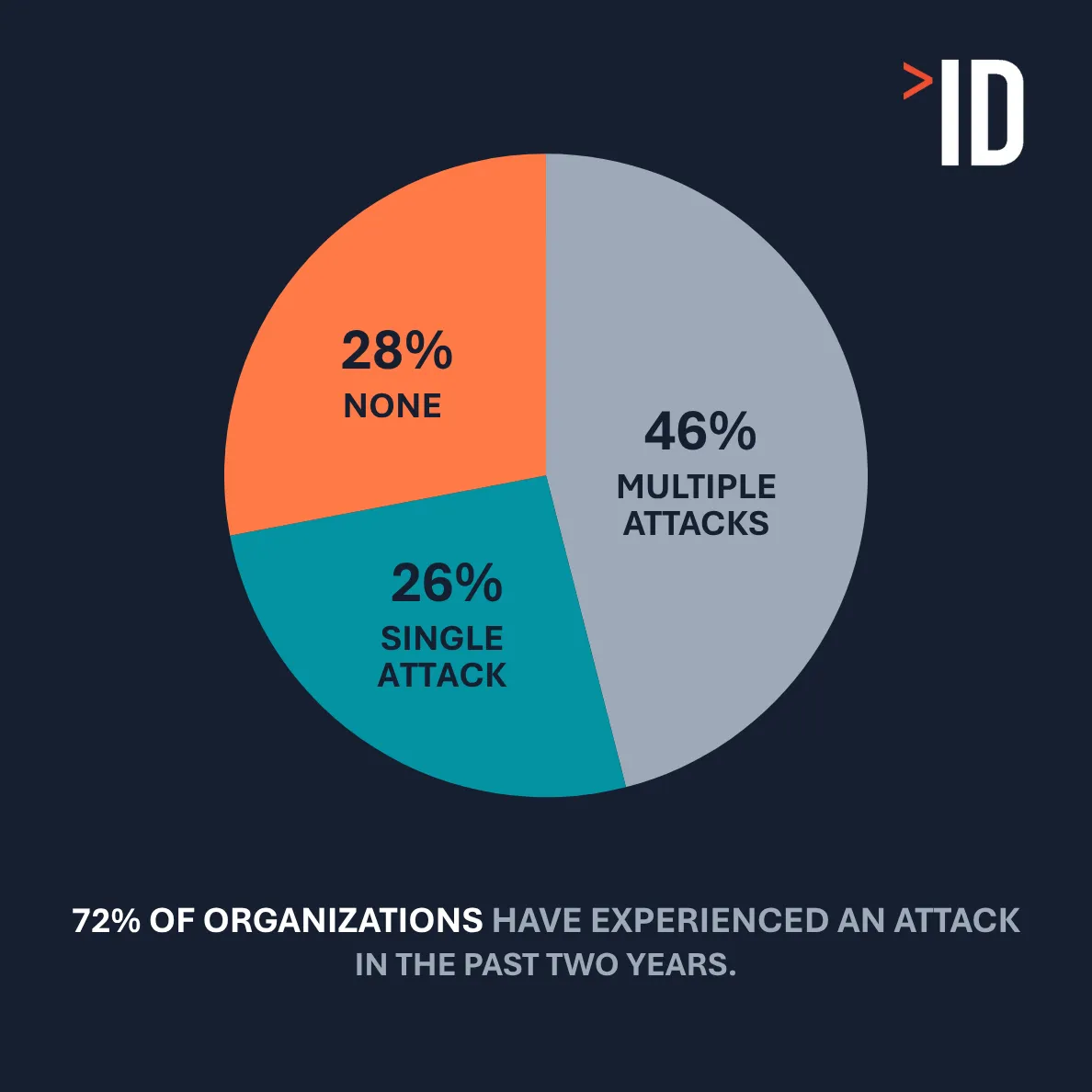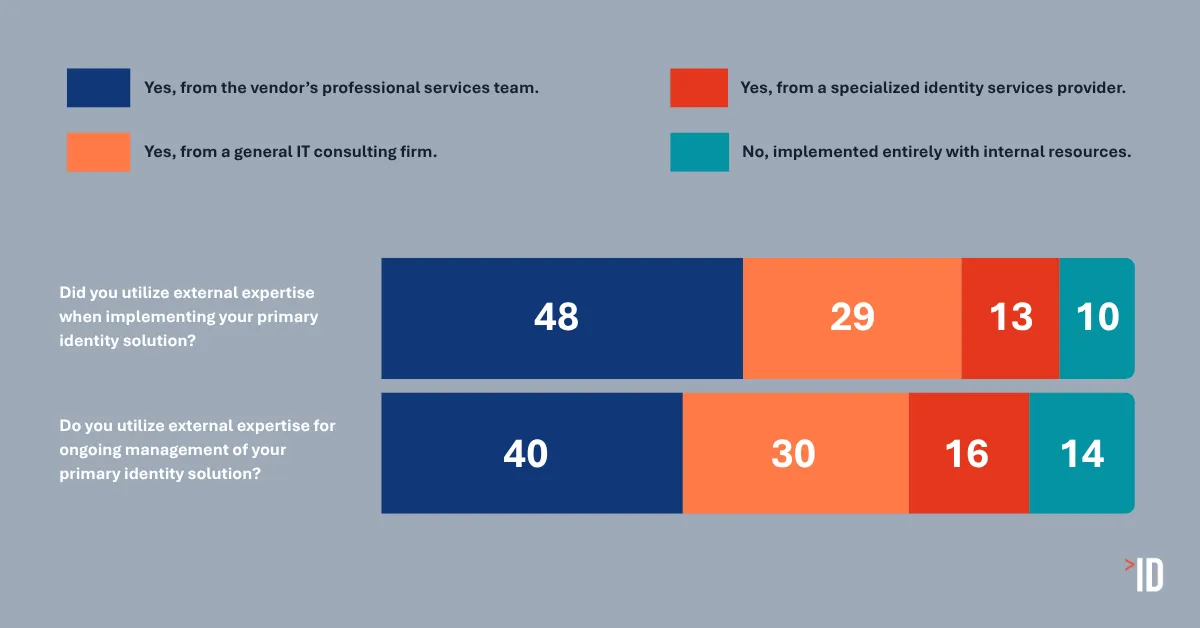According to our 2025 survey of IT leaders, if your business hasn’t experienced at least one known security incident in the past 24 months, you’re in the minority. Nearly three-quarters of businesses report at least one attack, and almost half have identified multiple. And that’s only counting the breaches, unauthorized access events, and compromises of which companies are actually aware.
The reality is, identity credential theft is a thriving black market, and the bad actors perpetrating the attacks are getting better at their subterfuge all the time. This, along with a landscape of ever-evolving identity technologies and compliance mandates, helps explain why most companies seek out some help with implementing and/or managing their identity solutions, as well as why only a handful of companies choose the DIY identity implementation route.


However, even companies that know they would like some help with their identity and access management (IAM) system don’t always know what flavor of help is best suited to their needs. This blog takes a closer look at two common support options—Managed Identity Services Providers (MISP) and Managed Security Services Providers (MSSP)—and helps explain the key differences between them so you can make the best choice for addressing your unique identity needs and challenges.
One letter can make a big difference.
At first glance, it can feel like the difference between a MISP and a MSSP is splitting hairs. Either type of organization is more than capable at effectively implementing and managing modern identity programs…right? Short answer – kind of.
While MSSPs are often the better-known option, their broad cybersecurity focus may not address the increasingly complex identity needs of modern organizations. Further, MSSPs offer a broader range of expertise, meaning they can help cover security issues beyond identity. But that doesn’t mean an MSSP is everything an MISP is, and more. Where MSSPs shine in breadth of expertise, they may not be able to offer a high level of specialized, targeted mastery in any one area.
When exploring different types of managed services, remember that they are not all created equal. Here’s a handy side-by-side comparison of MISPs and MSSPs:
| MISP | MSSP | |
|---|---|---|
| Primary Focus | Identity and Access Management (IAM) | General cybersecurity; threat detection and response |
| Expertise Level | Deep IAM specialization and expertise in modern identity issues, including single sign-on (SSO), multifactor authentication (MFA), biometrics, privileged access management (PAM), lifecycle management, risk-based access controls, and governance | Broad security coverage and knowledge of the entire tech stack, infrastructure, and network security |
| Services Provided | IAM and identity-centric architecture strategic guidance, design, implementation, optimization, management, and support | Security monitoring, Security Information and Event Management (SIEM), firewall and VPN management, endpoint protection, vulnerability scans |
Building the right managed services support teams.
As IAM increasingly becomes the cornerstone of modern enterprise security, it’s worth giving some serious consideration to finding an MISP that can provide the specialized expertise your organization will need to navigate IAM complexity. The partnership of an MISP is especially critical for any organization that operates a complex, cloud-based, or hybrid IT environment and/or that needs to securely control who has access to which resources.
Here are some of many specific scenarios under which organizations should consider working with an MISP:
- Moving to a hybrid or multi-cloud environment where unified identity management is a must
- Migrating to a modern IAM platform such as Okta or Cyberark
- Optimizing existing IAM software and looking for strategic guidance versus just tech support
- Preparing for a Zero Trust initiative or adopting Zero Trust architecture
- Managing complex identify workflows (including onboarding and offboarding) across the enterprise, such as those involving contractors and third parties
- Struggling with identity lifecycle complexity and looking to automate identity lifecycle and improve security hygiene
- Operating in a regulated industry, such as finance or healthcare, requiring strong access controls
- Working toward compliance with IAM standards (e.g. SOX, GDPR, HIPPA)
- Working with an under resourced internal IAM team
In many cases, companies can benefit from working with both an MISP and an MSSP. MSSPs are ideal for 24/7 threat monitoring and incident response and play a critical role in the broader security ecosystem. Meanwhile, an MISP provides deep expertise for identity transformation and governance. Think of it this way: the MSSP alerts you to suspicious activity, while the MISP helps close the gaps that allow that activity to happen in the first place.
Turn identity into a growth enabler, not just a security checkbox.
Identity isn’t just the first line of defense in modern security; it can be a competitive advantage for companies looking to minimize business disruptions and ensure the greatest level of trust from their customers and partners. By partnering with a qualified MISP, companies can tap into the specialized identity expertise they need to address challenges and opportunities strategically and at scale…turning identity into real business value.
Ready to build your managed services team?
Whether you’re already working with an MSSP or exploring managed support for the first time, pairing that with a trusted MISP can help you close the identity gap and secure your environment end to end. Let’s talk about how BeyondID can support your IAM journey.










